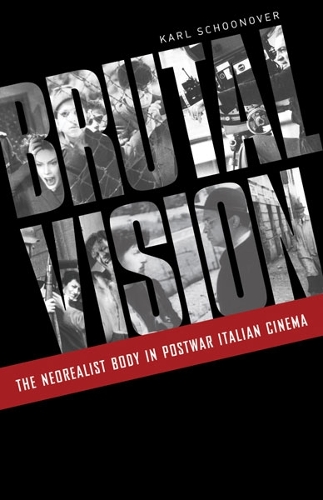
Brutal Vision: The Neorealist Body in Postwar Italian Cinema
(Paperback)
Publishing Details
Brutal Vision: The Neorealist Body in Postwar Italian Cinema
By (Author) Karl Schoonover
University of Minnesota Press
University of Minnesota Press
26th April 2012
United States
Classifications
General
Non Fiction
Digital, video and new media arts
791.430945
Physical Properties
Paperback
328
Width 140mm, Height 216mm, Spine 23mm
Description
Film history identifies Italian neorealism as the exemplar of national cinema, a specifically domestic response to wartime atrocities. Brutal Vision challenges this orthodoxy by arguing that neorealist films--including such classics as Rome, Open City; Paisan; Shoeshine; and Bicycle Thieves--should be understood less as national products and more as complex agents of a postwar reorganization of global politics. For these films, cinema facilitates the liberal humanist sympathy required to usher in a new era of world stability.
Reviews
"If there were ever any doubts about neorealisms enduring power to generate fine scholarship, Karl Schoonovers book should lay them to rest. To this most exhaustively studied body of films, the author brings a doubly original perspective-both geopolitically oriented and ethically charged. The result is a theory of spectatorship that goes far toward accounting for neorealisms pivotal role in the history of film." Millicent Marcus, author of After Fellini: National Cinema in the Postmodern Age
"While many scholars have struggled to describe the film movement known as neorealism, Brutal Vision advances a different and intellectually productive approach to a vexed subject. The innovative book undertakes a multi-faceted rewriting of post World War II cinema history in a national and international context." Marcia Landy, author of Stardom, Italian Style: Screen Performance and Personality in Italian Cinema
"This challenging studywith its surprising, persuasive new connectionsoffers many fresh insights into familiar films. Highly recommended." CHOICE
"Karl Schoonovers study is a thoroughly worthwhile reconsideration of Italian neorealism. The text accomplishes an always valuable and always challenging objective, namely, that of offering a new critical perspective on a critically well-trodden field. In a seamless blend of theoretical, formal, and archival analysis, Schoonover proposes a future itinerary for scholarly work on neorealism."Italian Culture
"After reading Brutal Vision, it will not be possible to observe the pain of Italian cinematic bodies without thinking of the geopolitical antes being waged on Italys body-politic during the second half of the twentieth century. However, the importance of Schoonovers book goes well beyond Italian borders. Brutal Vision is a convincing warning against a cinema of pity, and a cautionary tale on the risks of any representational mode founded on the spectacularization and exploitation of suffering. In an age of perpetual humanitarian crisis, Brutal Vision is of utmost urgency and relevancy."Journal of Italian Cinema & Media
"Schoonovers study severs neorealism from the dominant debate on its centrality to Italian national identity and film history, and reimagines it on a global plane. Distinctively, however, Schoonovers pursues not a discussion of neorealisms influence on past or present world film styles, but bringing and international and transnational perspective to bear on its geopolitical context." Screen
Author Bio
Karl Schoonover is assistant professor of film studies in the Department of English at Michigan State University. He coedited the anthology Global Art Cinema: New Theories and Histories.
